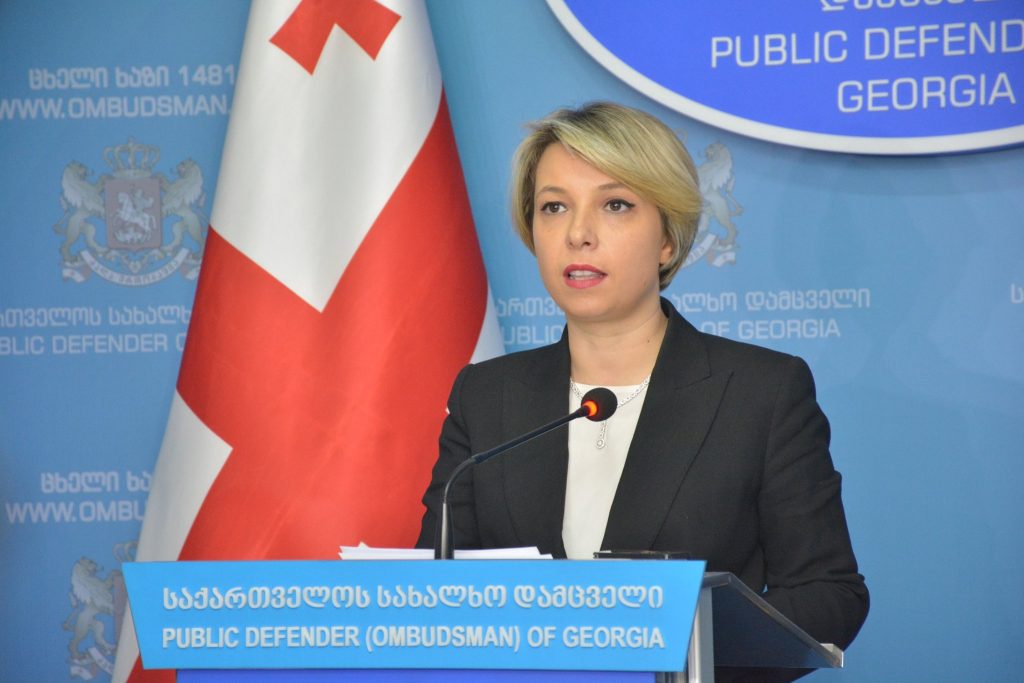Georgian Ombudswoman: prisons run by 'cell chiefs'
Public Defender of Georgia Nino Lomjaria has accused the country’s penitentiary system of using ‘criminal elements’ against the Public Defender’s Office.
During the briefing, Lomjaria said that one of the inmates of the Gldani prison threatened an officer of the Ombudswoman’s office who came to monitor the prison and demanded that he leave the institution.
Lomjaria went on to say that the prison administration is probably behind the aforementioned verbal attack.
The Ombudswoman emphasized that penitentiary facility No. 8 in Gldani is a closed-type prison, where prisoners are only allowed to leave the cell with the permission of the prison administration.
The inmate who was threatening the officer was able to move freely about when the latter arrived at the facility. According to Lomjaria, this is not an isolated case.
Ombudswoman Lomjaria also claimed that the influence of ‘thieves-in-law’ is growing in prisons. Lomjaria demanded the Minister of Justice raise the issue of liability of the director-general of the penitentiary service, as well as other responsible officials.
“In recent months, a certain group of prisoners, controlled by the administration and so-called ‘cell chiefs’, have been systematically carrying out verbal attacks, threats, and aggression against the employees of the Public Defender’s Office”, Lomjaria said, and asked for additional security measures for the Public Defender’s Office employees who are tasked with monitoring prisons.

She described criminal gangs as the “informal rulers” of prisons, that enjoy the support and encouragement of prison administrations.
Lomjaria said that she has repeatedly reached out to various high-ranking officials, and all of them were aware of the fact that the prisons were run by criminals and the informal ‘governors’ of prisons [inmates], yet the issue has remained unresolved.
Lomjaria said that inmates were frightened and avoided talking openly with the representatives of the Ombudsman.
Ombudswoman Lomjaria also noted that the number of complaints sent out from the penitentiary facilities is decreasing year by year.
This is the case in both the closed-type prisons where the inmates remain under the total control of the prison staff and in the semi-open prisons, where inmates enjoy relative freedom of movement. Lomjaria believes that this proves that in semi-open prisons, too, the order is established by the informal governors and criminal gangs.
Ombudswoman Lomjaria said that she will inform all international and donor organizations that provide financial assistance to the special penitentiary service of the current state of affairs in the country’s prisons:
“I will do my best to draw the attention of the international community to the fact that Georgian penitentiary system is inciting criminals against representatives of the Public Defender’s Office”.
This was not the first time that the Public Defender addressed the alarming state of Georgian prisons. A year ago, there was a confrontation between Nino Lomjaria and the former Minister of Justice, Thea Tsulukiani.
Last year, Nino Lomjaria presented a report during a meeting of the parliamentary committee on human rights, in which she addressed the situation in the four largest penitentiary institutions in Georgia. Former Minister of Justice Thea Tsulukiani referred to the report as one full of rumors and lies.
The official response of the Special Penitentiary Service
The Penitentiary Service responded to the Public Defender’s accusations with an official statement of its own.
In this statement, the Special Penitentiary Service of Georgia said that the inmate’s personal attitudes towards the employees of the Public Defender’s Office are beyond the Service’s control.
The statement went on to say that “the decrease in the number of prisoners’ complaints could be caused by the negative attitude towards the Ombudsman’s Office, rather than some fictional negative influence from prison administration”.
The service denies the presence of a criminal subculture and “prison watchers” in its facilities, and reinstates that all of the institutions in question are “run by the state.”


















